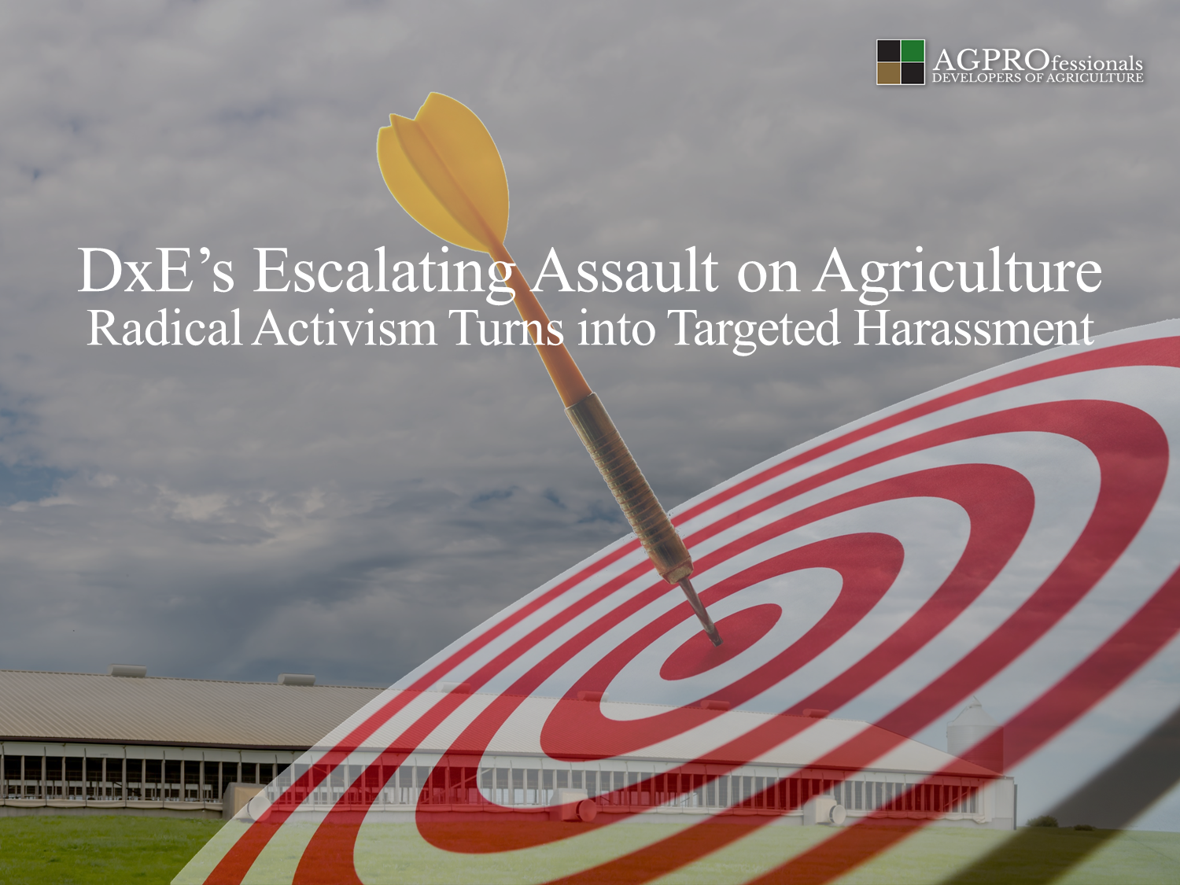
Understanding and Preparing for the Threat to Animal Agriculture
Direct Action Everywhere (DxE) is a radical animal rights organization whose stated goal is “animal liberation,” aiming for the complete elimination of animal agriculture. While the group presents some campaigns under the guise of “transparency” or “humane reform,” its long-term mission is to end all animal protein production and remove these food choices from the marketplace.
Tactics Used by DxE
Over the past decade, DxE has escalated its methods from protest to direct targeting of agricultural professionals and facilities. Their activities have included:
- Trespassing and facility invasions to obtain unauthorized video and remove animals.
- Doxxing—publishing private information (home addresses, photos, family details) online.
- Harassment at private residences of agricultural professionals often occurs using megaphones, banners, and repeated protests.
- Corporate disruption campaigns targeting processing plants, company headquarters, and suppliers.
- Ballot initiatives and legislative pushes aimed at banning standard livestock practices or large-scale animal production.
- Coordinated online harassment through activist networks.
Recent DxE Campaigns
- Perdue Farms (2023–2024): DxE staged repeated protests at the home of a Perdue subsidiary operations director, including eight demonstrations in one year. Protesters used amplified sound, large banners with the target’s image, and online posts including his home address.
- Perdue Headquarters (Maryland): Organized demonstrations calling for the closure of a California processing plant, alleging unverified animal welfare and public health concerns.
- Smithfield Foods (2017): Members removed piglets from a Utah facility; felony charges were filed.
- Diestel Turkey Ranch (2015): Allegations based on unauthorized footage were later dismissed in court.
- Golden Gate Fields (2021): Protests disrupted horse racing events.
- Whole Foods Markets: Multiple store invasions led to restraining orders.
DxE is also linked to “Project Counterglow,” an online mapping tool that pinpoints animal agriculture operations and sometimes individual personnel, encouraging further targeting.
Why Producers Should Take This Seriously
DxE’s actions go beyond peaceful protest. They present risks to:
- Biosecurity – Unlawful entry into facilities can introduce disease to livestock.
- Personal safety – Harassment and targeting of individuals and their families.
- Operational stability – Disruption of supply chains, processing, and sales.
- Reputation – Public allegations, often made without independent verification.
Recognizing Warning Signs of DxE Activity
Producers should be alert to:
- Social media posts by DxE naming your operation or region.
- Requests for facility access from unknown or unaffiliated individuals.
- Increased activist activity in nearby communities.
- Public records requests related to your permits or inspections.
- Unfamiliar vehicles, drones, or individuals near livestock areas.
Steps to Protect Your Operation
- Secure your facility – Limit access points, post signage, and maintain visitor logs.
- Enhance monitoring – Use cameras to document activity near property lines and entrances.
- Protect personal information – Avoid posting home addresses or identifiable family information online; consider removing such details from public databases.
- Document incidents – Keep detailed records and notify law enforcement of suspicious or unlawful activity.
- Engage industry allies – Stay in contact with state livestock associations, commodity groups, and legal counsel.
- Prepare a crisis plan – Have a clear communication strategy for responding to public allegations or media inquiries.
AGPROfessionals Works to Help You Stay Informed
Direct Action Everywhere’s strategy is not about incremental reform—it is an organized, long-term campaign to dismantle animal agriculture. By understanding their tactics, recognizing early warning signs, and taking proactive steps to protect people, property, and livestock, producers can help safeguard both their livelihoods and the future of animal agriculture in the United States.
